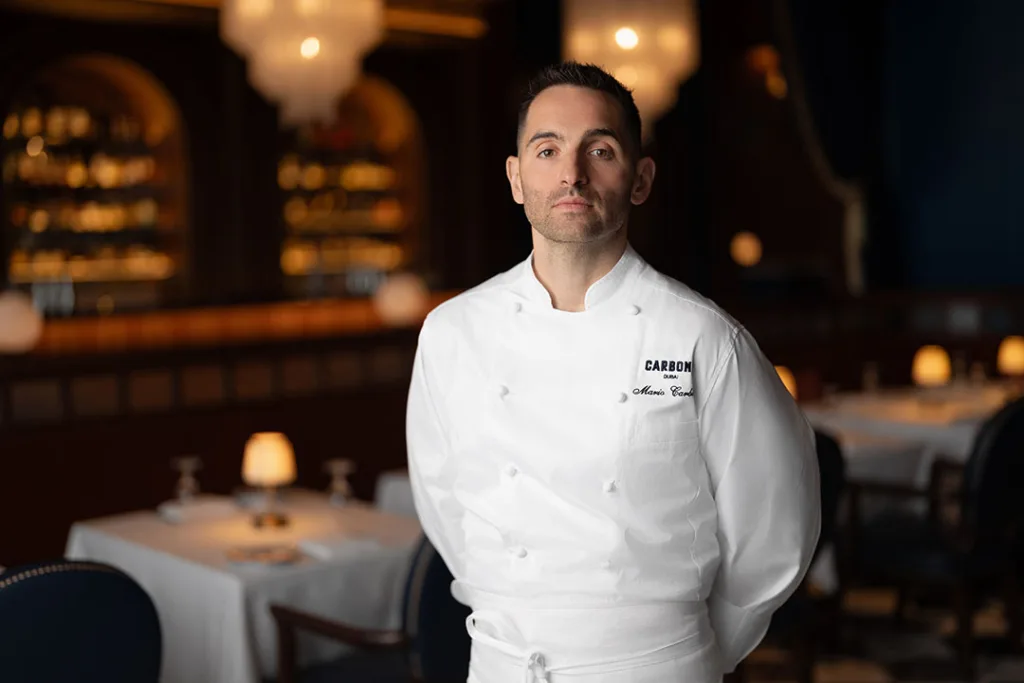Let’s be clear: Carbone doesn’t do Italian food. Not in the Nonna-approved, regional-purist sense, anyway. What they serve, with a swagger and a wink, is New York-style Italian food. Don’t get it twisted.
This isn’t some casual rebrand; it’s a deliberate, almost philosophical flex from the Major Food Group. Imagine taking Italy’s fiercely guarded culinary pride—where, as chef Mario Carbone puts it, “Each state has a different take on its food and they don’t crossover”—and transplanting that hyper-specific mindset to the most cosmopolitan city on earth. “What if we took that mindset and considered New York as another Italian state?” is the thinking behind Carbone and his other New York born-and-bred collaborators Rich Torrisi and Jeff Zalaznick.
It was an attempt to forge a culinary identity, a brash new signature that would, perhaps inevitably, set the table for something truly, unapologetically iconic. “It’s probably the most Italian thing to do, to not make Italian food the way others do,” he says.
Which brings us to the Spicy Vodka Rigatoni. Not just a dish; it’s the dish. The one that launched a thousand Instagram posts, solidified Carbone’s ‘it’ status, and became the culinary equivalent of a chart-topping single. “It’s a wonderful thing to have a hit song. I don’t get tired of playing it,” the chef behind it admits.
 Mario Carbone
Mario Carbone
The aim of Carbone [the restaurant] was to write “a typical menu that produced atypical results,” and for Carbone [the chef], penne alla vodka—often considered the ultimate “bastardisation” of Italian cuisine—became the unlikely inspiration. To bastardise a Sinatra line: If they could make it there, they could make anywhere.
The birth of the dish was surprisingly ordinary.
The restaurant’s original menu was almost complete, but something felt off. A missing piece in the pasta section, specifically, a popular vegetarian option. The answer arrived: penne alla vodka, seen not as a sacred cow, but as a challenge to elevate, to own. Rigatoni got the nod, mainly because the specific pasta die was already on hand. The ingredients were few, the execution swift. “No one at that table, at that time thought that what we had just stumbled upon was going to be the thing,” Carbone recalls, underscoring the dish’s humble beginnings. Back then, restaurants didn’t need a signature dish to signify its presence; news spread differently. This phenomenon, he notes, is a distinctly modern one.
So, how did this seemingly unassuming pasta dish transcend its origins and become a bona fide global icon? It starts with the taste, obviously. It was a popular dish to begin with, one people knew and loved, even in less-than-stellar iterations. But Carbone’s take? That’s where the magic happens. “Ours is particularly tasty because it has an addictive chemistry to it,” the chef explains. It’s that perfect storm of chewy noodle, a fiery kick from the spicy sauce, and the cooling balm of sweet onion and cream. Think “spicy, creamy thing”—akin to rock shrimp or halal cart fare with yogurt and chilli. It’s a flavour profile designed for repeat performance.
Then came the modern alchemy: social media. The “Spicy Rig” became more than just a meal; it became the ultimate signifier. To order it, to photograph it, to post it—that was your VIP pass, your declaration that you’d arrived at the culinary promised land. “Later in life, it became the dish that signified on social that you had been there,” he muses.
What began as a delicious, well-executed pasta became a self-perpetuating legend. “It’s happening and I can’t control it. You need to order it, sure, but I didn’t dictate that.” A hit song, indeed. And like any great track, it just keeps playing.
Carbone is now open at Atlantis The Royal, Dubai. Tel: +971 4 44262626 carbonedubai.com


Dining and Cooking